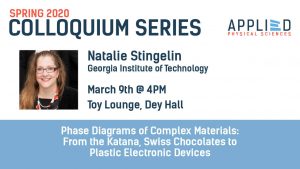
- This event has passed.
Colloquium Series: Natalie Stingelin (Georgia Tech)
Monday, March 9, 2020 @ 4:00 pm - 5:00 pm
 Join us for another event in the 2019-2020 Colloquium Series as APS welcomes Natalie Stingelin, PhD. to present on her recent research. Dr. Stingelin focuses her research on the broad field of organic functional materials, including organic electronics; multifunctional inorganic/organic hybrids; smart, advanced optical systems based on organic matter; and bioelectronics.
Join us for another event in the 2019-2020 Colloquium Series as APS welcomes Natalie Stingelin, PhD. to present on her recent research. Dr. Stingelin focuses her research on the broad field of organic functional materials, including organic electronics; multifunctional inorganic/organic hybrids; smart, advanced optical systems based on organic matter; and bioelectronics.
Natalie Stingelin is a Full Professor of Materials Science at the Georgia Institute of Technology. She is the Director of Georgia Tech’s Center for Organic Photonics and Electronics, and holds a Chaire Internationale Associée by the Excellence Initiative of the Université de Bordeaux. She had prior positions at Imperial College London; the Cavendish Laboratory, University of Cambridge; Queen Mary University of London, the Philips Research Laboratories, Eindhoven; and ETH Zürich. She is a Fellow of the Royal Society of Chemistry and has been elected to the class of 2019 MRS Fellows. Furthermore, she was awarded the Institute of Materials, Minerals & Mining’s Rosenhain Medal and Prize in 2014, and the Chinese Academy of Sciences (CAS) President’s International Fellowship Initiative (PIFI) Award for Visiting Scientists in 2015. While at Imperial College, she was recipient of a European Research Council (ERC) Starting Grant, as well as an ERC Proof of Concept grant. She was the Chair of the 2016 Gordon Conference on ‘Electronic Processes in Organic Materials’ and the Zing conference on ‘Organic Semiconductors’. In 2018, she organized the 14th edition of the International Conference of Organic Electronics (ICOE). She has published >190 papers in the area of organic electronics & photonics, bioelectronics, physical chemistry of organic functional materials, and smart inorganic/organic hybrid systems.
Learn more about the Stingelin lab here.
Phase Diagrams of Complex Materials: From the Katana, Swiss Chocolates to Plastic Electronic Devices
The physical organisation, from the molecular to the macro-scale, of essentially all macromolecular materials can profoundly affect the properties and features of the resulting architectures. I will discuss how rules that explain the mechanical properties of the Katana and distinguishes good from lesser tasty chocolates can be applied to organic semiconductors to manipulate their properties and, hence, and their consequent performance when used as active layers in organic photovoltaic cells. To illustrate this, a survey will be given on the principles of structure development from the liquid phase with focus on how to use phase diagrams to manipulate their phase transformations and solid-state order for the controlled design and manipulation of the final ‘morphology’ towards technological and practical applications, including organic solar cells.


